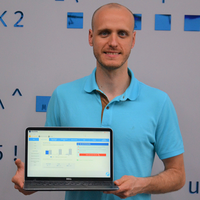Social media has not only created a new way of interaction between people, but it has also become a source of information for research on human behavior helping the development of tools for collective action. This is the field of work of the professor of computer science of the University of West Virginia (USA), Saiph Savage, whose advances led her to be chosen as one of the Innovators Under 35 Latin America 2018 from MIT Technology Review in Spanish.
This award focuses on her work with bots in social media capable of mobilizing users interested in certain topics to participate in collective actions. In 2015, Savage collaborated with Microsoft in the development of Botivist. This system analyzes the users’ activity on social media to identify their interests and points of view around them. When the system has chosen the most appropriate users for each collective action, the bots send a message encouraging them to participate.
The Mexican researcher explains her approach: "I want to go where people are, not develop an app that nobody is going to download and use." Twitter, Facebook, and LinkedIn allow any organization to reach a much larger audience than if they start from scratch. Thus, for example, it was possible to mobilize people interested in topics underrepresented in Wikipedia. "There are issues that no one talks about, empty in the encyclopedia." Savage explains that she decided to use the bots to "recruit Latin American women to contribute to biographies of other successful Latin American women." "The bots are tools to help humans do their job better," she adds. The recruited experts did not even have to learn how to edit Wikipedia: a bot was also a designer for this task.
One of the things that Savage discovered is that the most effective bots on recruiting activists were the ones that most clearly manifested their nature and intention. This contrasts with the surreptitious activity of the accounts with false identities that pose as real people and that have generated so much controversy due to their use in recent political campaigns, as in the election of Donald Trump as president of the USA (see the bots in social networks, suspects and guilty of spreading false news).
Precisely the use of bots by politicians was one of the reasons that motivated the invention of the Savage project. The outgoing president of Mexico, Enrique Peña Nieto, had already used them to boost his campaign. Now, Savage collaborates with the current president-elect, Andrés Manuel López Obrador, in the development of a digital strategy that involves the use of blockchain technology to manage social cooperation projects.
The professor of Applied Economics at the Rey Juan Carlos University (Spain), Guillermo de Haro, member of the jury of Innovators Under 35 Latin America 2018, considers that "Savage's different investigative facets, projects, solutions, and activism are amazing."




